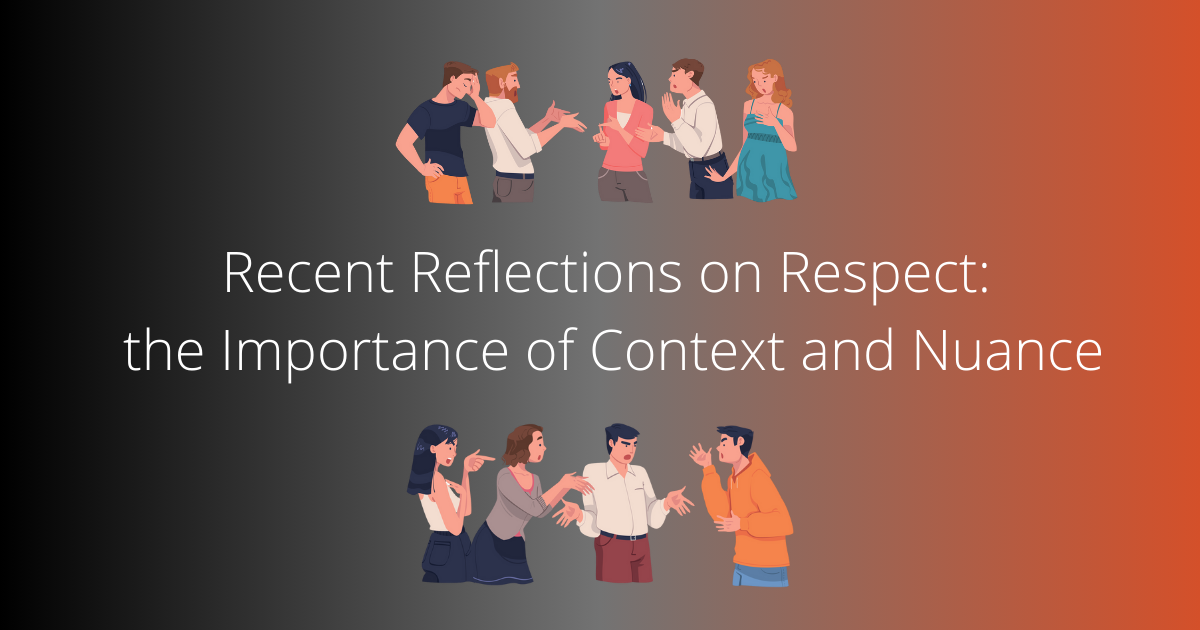Resources > Blog > Recent Reflections on Respect: the Importance of Context and Nuance

Despite the increased legal and community expectations surrounding respectful conduct and communication, I am seeing exactly the opposite. That is, there appears to be increasing disregard and inconsideration in how we treat those around us – along with an assumed (yet unfounded) entitlement to engage in such head-shaking behavior.
By disrespect, I include outright disrespect actively directed at those outside our self-defined community as well as general indifference and apathy towards anyone’s suffering but our own.
With some exceptions, I do not think this disrespect comes from a place of informed and intentional malice.
Instead, I see the following four factors as contributing to such behavior:
- A lack of awareness/education around the complexities of what is – and is not – legally considered appropriate and acceptable conduct – both in general and more importantly, when we find ourselves disagreeing with others. Far too many individuals – employees, leaders and members of the public – attempt to justify unlawful and unreasonable communication on the basis of their personal disappointment, dislike, dispute or disagreement with others. The law does not justify this type of response.
- A lack of clear expectations placed on those who choose to enter and participate in any organization including employees, leaders, students, patients, elected officials and volunteers. Clear expectations must be established that define how individuals must show up and treat others if they wish to work at, participate in or receive services from institutions. It is not – nor should it be – a “free for all” when it comes to how people text, email, talk to, talk about and treat each other. Everyone should be expected to communicate, advocate and interact with respect and civility, regardless of their personal feelings or opinions about those around them.
- A lack of clear, measured and lawful consequences in response to these expectations not being met. Expectations around respectful communication and conduct are meaningless if individuals are permitted to ignore them without repercussion. Safe and respectful spaces cannot meaningfully exist if nothing happens to those who behave poorly. To be lawful and defensible, any response must be imposed by leadership, following an objective review. “Getting back at others” by inciting division, posse-building and engaging in workplace vigilante justice is neither respectful nor defensible.
- A lack of support for individuals who are struggling with personal or workplace stressors or possibly suffering from underlying health conditions including addiction. Burnout and fatigue are at an all-time high as are related mental health concerns. Individuals need to be supported through these issues in a reasonable, measured, customized and caring manner, one that also and as importantly recognizes the rights of others to work and participate in a psychologically safe, equitable and healthy workplace.
A few final thoughts to consider – and promote – in your workplace when building or rebuilding a culture of safety, respect and inclusion:
- While we all have a “right” to respect, we have a corresponding responsibility to act in a respectful manner. Rights do not exist in the absence of responsibilities.
- While we all have a right to “voice” concerns and opinions, we have a corresponding obligation to “listen” to others. There’s a reason we have both a mouth and ears.
- While we are often triggered (and harmed) by others’ words and behavior, they are just as easily triggered (and harmed) by ours – many times, in the same conversation/interaction. Cautious communication, consideration and care for those around us will build safe and respectful cultures – constantly defending and advocating for an apparent (and non-existent) “right to harm” will not.
- Yes, you are stressed and yes, legitimately so – but so are many (if not all) of the people around you. Your stress does not give you the right to disregard or add to the struggles and suffering of others.
- You might be offended by someone’s behavior – and at the same time, or perhaps in response, engage in offensive behavior as well. Their behavior will not justify your own. We are all responsible for the role we play in any disrespectful exchange that unfolds.
While I am disheartened by the blatant intolerance and inconsideration that exists in many organizations, along with an apparent sense of entitlement to behave in this way, I genuinely believe that individuals and organizations can turn this around by teaching, practicing and implementing the principles set out above.
If your organization is facing dysfunction due to unresolved conflict, reach out to my team at [email protected] to learn about training and services that I can provide to help support you in building a respectful and productive team.
Subscribe to my LinkedIn Newsletter to be the first to get practical advice on how to build productive teams through accountability, respect and effective conflict resolution. https://buff.ly/3SqhNS
Click here to read more blogs about building respect in your workplace.
